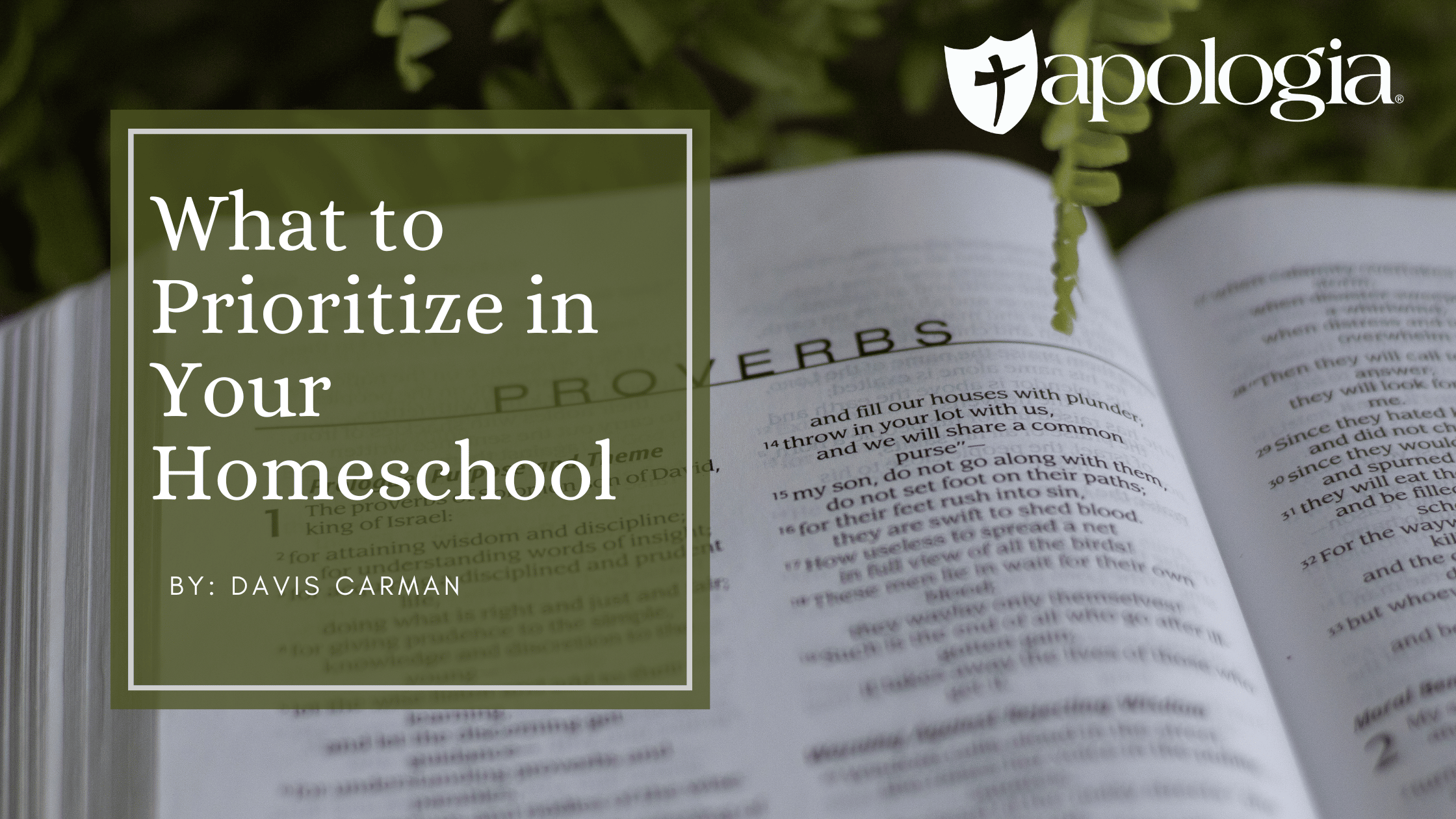
What to Prioritize in Your Homeschool?
His divine power has granted to us all things that pertain to life and godliness, through the knowledge of him who called us to his own glory and excellence. — 2 Peter 1:3
When you made the big life decision to homeschool your children, you took on the monumental responsibility to train, disciple, and educate them in the fear and admonition of the Lord. For some, this may have felt overwhelming; for others, exhilarating. For all, it’s a walk of faith.
There are important lifestyle decisions to make, including schedules and routines. Academic decisions consist of curricula and extracurricular activities. Big-picture thinking involves setting goals and selecting priorities unique to your family.
It’s been said that priorities are what you do, and everything else is just talk. The goal of this article is to consider the most important priorities you can establish for your family’s homeschool. When you educate your children at home, you have already stepped way outside of the box, so don’t settle for reading, writing, and arithmetic. Think big. Think differently. Here are three priorities that rise to the top of my list, which I highly recommend to you.
RELATIONSHIPS
When Jesus was asked which commandment was greatest, He had a rock-solid answer. The greatest is to love God with all you heart, soul, mind, and strength (Matthew 22:34-40). He continued by stating that the second greatest is to love your neighbor as yourself. When I think of how to make relationships a priority in a homeschool, I believe it starts with one’s relationship with God. Your kids will only know and love a God as big (or as small) as the one you love, so make sure you are deeply in love with God, and then point your children to the same one-and-only, triune, holy, and glorious God.
After loving God, homeschooling allows for a fantastic opportunity to build the relationship you have as parents with your kids. This can be followed closely by sibling relationships. All seven of our children are young adults who’ve left the nest, and three are married with children of their own. Yet they all still love spending time together. (The upcoming Thanksgiving holiday is probably our family’s favorite time of the year to gather.)
And finally, when you homeschool, you can build into your family disciplines a love for neighbor. Maybe you adopt a church or community service project. Some families go to nursing homes to visit or entertain the residents with singing or playing music. Again, what you do in this regard will be the biggest statement about how you prioritize relationships in your family and homeschool.
KNOWLEDGE OF CHRIST
What if you could teach only one subject to your kids? What would you pick? According to 2 Peter 1:3, the knowledge of Christ will provide everything you and your kids need for life and godliness. Everything for life. Everything for godliness. Everything! Talk about a comprehensive curriculum.
I actually think that teaching only the Bible is a pretty good idea. But assuming you include a good dose of science, math, reading, writing, and history, make sure you prioritize the knowledge of Christ, the living Word of God. Establish this as the first subject you teach and review with your kids each school day.
As you study all these subjects, be sure you avoid a humanistic approach that believes we humans are capable of figuring out the mysteries of God and His creation all on our own. Yes, God has given us a mind and an ability to reason, but eating of the tree of the knowledge of good and evil got us into a sin problem. Let’s not keep repeating that same error. As Saint Augustine of Hippo stated, “I believe in order to understand.”
Some days you won’t get it all done. That’s simply how life works. There will be inevitable interruptions, distractions, and emergencies. With each day, what you do first says what you actually prioritize. Everything else is — that’s right — just talk.
FAMILY LIFE
Explicitly stated right in the word homeschool is a priority not to be undervalued: the context of family and everyday life at home. Dr. Deb Bell, a homeschool mother, speaker, and author, did her doctoral work on educational development and psychology. One of her findings is this: If you tried to design the perfect school setting that would be conducive to effective learning by students, the result would be a home. In other words, when it comes to education, the context is just as important as the content.
In this recent article written by Charles T. Carman (my oldest son, homeschool graduate, and current PhD student), educating your children at home has at least one distinct advantage compared to other options. Public, private, and classical schools might be able to compete with homeschooling based upon academic measures, but they can’t replicate home and family life. Ponder this excerpt:
Homeschooling’s true work has been to rescue the home from its modern erasure. The home, after all, is where the most urgent learning takes place: where sons learn from fathers, daughters from mothers, siblings from each other; where morning prayers are made, daily bread is baked, yearly fruits are canned, generational stories are repeated. These are not quaint or poetic images. The consequences of a citizenry that loses these habits are deadly for the body and the soul.
When my children started leaving the nest, they reflected on how their upbringing was so different from the experience described by their peers. For example, my kids had memories of family meal times — many, many memories. Their peers could hardly remember sharing a meal with their family members. For my kids, growing up at home with many shared memories resulted in a family culture that was centered on life at home, something foreign to many of their peers.
CONCLUSION
Relationships (with God, parents, siblings, and neighbor), a knowledge of Christ, and family life in the home. These are three worthy priorities to consider for your family and homeschool. What’s important to you? What will you put at the top? I’ve offered three suggestions, but you get to decide. A wonderful thing about homeschooling is that you can customize everything to your family: the routines, the calendar, the curricula, and the priorities. This comes with a lot of freedom and requires a great amount of responsibility. And as you walk down this path less traveled, the things you do will tell the world, your kids, and yourself what you prioritize. Everything else is just talk.
Creation-based Resources for Your Homeschool
If this article challenged you to make teaching God’s Word a priority in your homeschool, then check out Apologia’s new two-volume Bible curriculum, The Word in Motion.
Published in partnership with Walk Thru the Bible, The Word in Motion takes the intimidation out of teaching Scripture. This homeschool Bible study curriculum for all learning styles — visual, auditory, and kinesthetic — equips families to read the Word of God with passion, purpose, and big-picture understanding.
With The Word in Motion, you can teach your children to know, love, and live God’s Word by showing them how the books of the Bible fit together to tell the grand story of God’s love for His people. Lessons include hand motions to get your kids moving as they learn storylines, characters, and key words for all 66 books of the Bible. In volume 1, students will explore the people, places, events, and all 39 books of the Old Testament. Volume 2 covers the same for all 27 books of the New Testament. Along the journey, students will gain a deeper understanding of how the Bible in its entirety forms a single, glorious story of God’s love for humanity and His plan for our redemption. Once they see and know the big picture, even kids can read the Word with purpose, passion, and real understanding.
The course includes streaming video lessons by author Rachael Carman, stirring narratives, thought-provoking review questions, and engaging notebooking journal activities. To learn more, go to Apologia.com/Bible — a great place to explore God’s Word.
Walking by faith and enjoying the homeschooling adventure of a lifetime!
Davis Carman
Davis is the president of Apologia Educational Ministries, the #1 publisher of Creation-based curriculum for homeschooling families. He believes that if there was ever a time to homeschool, it is now! You can hear more of what he has to say at the Let’s Talk Homeschool Podcast.
© 2022 Davis Carman






